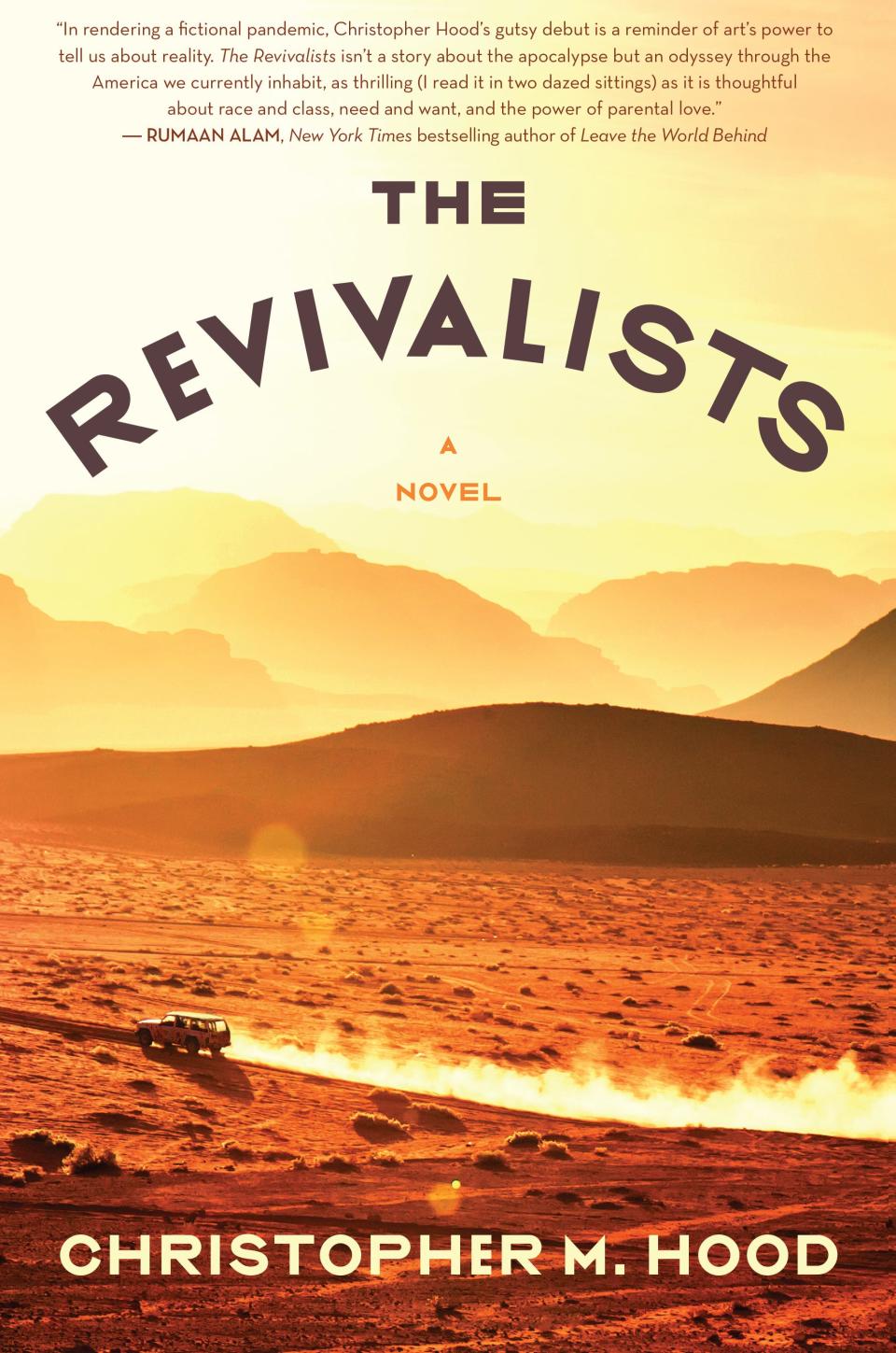Taking doomsday on the road: 'The Revivalists' imagines a post-pandemic apocalypse
Why spend your apocalypse moping around the house?
Cooking baked beans over a flaming Sterno can, reading old paperbacks by candlelight — that's no way to live. You have to get out and see the world.
Ruined cities! Melting icecaps! White supremacist militia groups! Massive wildfires! Religious cults!
That's where Nyack author Christopher M. Hood takes us with his first novel, "The Revivalists," one of a number of recent books that have plumbed a new sub-genre: the apocalyptic "road" story.
The book, from Harper ($27.99 hardcover) drops Oct. 4. Esquire has listed it as one of their 20 Best Books for Fall 2022.
Apocalyptic novels are nothing new — and, alas for our endangered species, nothing rare these days.
But the apocalyptic road novel, like "The Revivalists," "Station Eleven" (Emily St. John Mandel), "The Dog Stars" (Peter Heller"), and "The Road" (Cormac McCarthy), is a thing unto itself. If "Travels with Charley" and "On The Road" sent their characters out looking for America, post-doomsday books like "The Revivalists" show us what they find amid the wreckage.
More:Censorship may be evolving, but is not new in the United States
But here, says Hood, is where his book is different from some of the others. What his characters find is love.
"I really wanted to tell a story, set after the apocalypse, where people really do love each other," said Hood, a Montclair native. "Yes, they fight. But they find their way back to a marriage that means something."

His characters are a psychologist and his financial analyst wife — Westchester residents — whose lives are turned upside down, first by a global pandemic that kills 70 percent of people on earth, and then by news that their daughter, isolated out on the west coast, has joined a religious cult.
Their odyssey across the ruined United States to rescue her is exactly that — an odyssey. If the wife's name Penelope doesn't clue you, then you may notice that the various scavengers, druggies, killers and oddballs they encounter on their dangerous trek are inspired by episodes in Homer.
"Every chapter actually has a direct correspondence to 'The Odyssey.' " Hood said. "The Delaware Water Gap is Scylla and Charybdis. There are the lotus eaters in Pennsylvania. Originally I had titles in each chapter that made the references clear, and my editor convinced me it read better as a straight novel. So they became Easter eggs."
Quite clearly, the global pandemic of COVID-19 inspired the novel's deadly "shark flu," which emerges from the melted permafrost of Iceland to lay waste the world. And much else that the book touches on, from right-wing militias to religious cults to climate change to racism and white privilege, is all 2022 talking points.
A story of today
"This isn't really about the future, it's really about now," Hood said. "Obviously, it's fiction. The world of the book is not the world of now. But the book is dealing with a lot of the same stuff we have to wrestle with now."
As a teacher of writing at Manhattan's prestigious Dalton School for 14 years, he's well aware that teenagers, more than anyone, are wrestling with these fears. What he's writing about, his students are thinking about.
"My students are growing up in a world on fire," he said. "My generation grew up with a kind of optimism, a sense of things getting better. And my students are reckoning with climate devastation, the rise of fascism, and the sense that our financial system doesn't work for regular folks anymore. Given all that, I think there's a tremendous interest in what a fiction writer might be thinking of, in terms of the future."

Unlike much doomsday fiction, however, "The Revivalists" is chiefly about personalities. Above all, Hood said, it's a portrait of a marriage. A good one.
Bill and Penelope may be opposites in some ways — one white and one Black, one who leads with empathy and one a Type A logician — but they work as a team. Above all, they cherish their daughter. And they'll do anything to get her back.
More:Insurrection or sedition? Fascism or socialism? Here's a glossary of terms to understand it all
More:Shakespeare made it through his plague. Can he get us through ours?
"It's been my experience that marriage makes both of you better — if you're joined by your love of each other, and how much you love your child," he said. "But I feel like in literature, you're more likely to read about a miserable marriage than a happy one."
The book's couple with one daughter is not precisely a portrait of his own household — though he too is a Hudson Valley resident, and he too has a wife and daughter, Greta and 10-year-old Daphne. But as Tolstoy famously said, "All happy families resemble each other."
"The heart of this book is about a marriage," he said. "It's a love story. And that's the oldest story we've been telling. Even the Odyssey and the Illiad, with their wars and huge journeys, all begin with a love story."
This article originally appeared on USA TODAY: 'The Revivalists' book by Christopher Hood set in post-pandemic world

 Yahoo Movies
Yahoo Movies 
